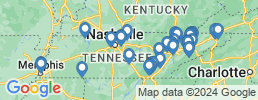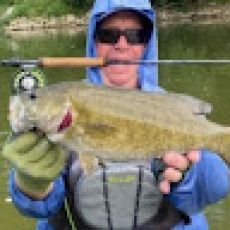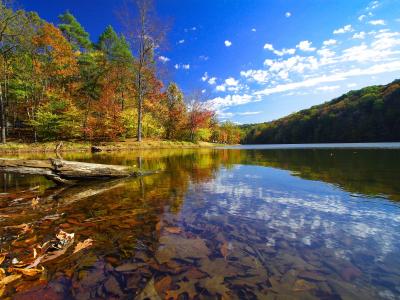Tennessee Angelausflüge
Wir haben die besten Ausflüge aus 35 Angeboten in Tennessee für Sie gefunden - geben Sie einfach Ihre Reisedaten ein und prüfen Sie die Verfügbarkeit!
Beliebteste Orte in Tennessee
Häufige Fragen zu Angelausflügen in Tennessee
- 4-hour fishing trips – €304
- 5-hour fishing trips – €202
- 6-hour fishing trips – €409
- 7-hour fishing trips – €225
- 8-hour fishing trips – €598
Fishing in Tennessee
Cast your line here once, and it’s easy to become a Tennessee fishing fanatic. This landlocked state boasts some of the best freshwater fishing in the United States, a secret that more anglers are discovering each year. Many visit “The Volunteer State” to experience the heart and soul of country music, which draws inspiration from The Great Smoky Mountains, Tennessee’s mighty rivers, and other wonders this state has in store. This rich land holds dozens of lakes, man-made reservoirs, and more than 20,000 miles of streams. For anglers, this translates into a whole lot of action—from fly fishing to Catfish “noodling.”
Top Fishing Spots in Tennessee
Reelfoot Lake
Reelfoot is one of the smaller fishing Lakes in TN (12,000 acres), but it boasts the biggest reputation. Tucked away in the northwest corner of the state, Reelfoot Lake offers the best Crappie, Bluegill, and Bass fishing in the south (in that order). In fact, the Crappie fishing here so good that Reelfoot Lake supports the only commercial Panfish fishery in the U.S.. While Largemouth Bass are only the third most popular catch in these waters, don’t let that give you the wrong impression—the fishing is excellent.
Douglas Lake
When it comes to Crappie fishing in Tennessee, Douglas Lake is second only to Reelfoot. You can also catch Bass here throughout the year, with local Largemouths growing as large as 12 lbs in spring. This fishing hole is located less than an hour’s drive east of Knoxville, which makes it relatively accessible compared to its competition.
Dale Hollow
Located right at the top of the state, Dale Hollow Lake is practically synonymous with Tennessee Bass fishing. In fact, the world record Smallmouth Bass was caught right here in 1955, as well as the 3 heaviest Smallmouths ever recorded. These legendary game fish reach their peak between March and May, but continue to produce fantastic action on summer nights. Good fishing continues through winter, but the pace is much slower. Dale Hollow also holds Largemouth Bass, White Bass, and loads of Crappie. In December and January, anglers here have the opportunity to catch Muskellunge, as well.
Great Smoky Mountains National Park
For the best Trout fishing in Tennessee, look no further than the Great Smoky Mountains National Park. Here you can cast your line for native Brook Trout in hundreds of miles of streams. The well-known Little River also hosts Rainbow and Brown Trout, as well as Smallmouth Bass.
Tennessee River and More
Anglers in Tennessee are lucky enough to get wind of this river twice, both in the east and along the state’s western border. More than anything, the Tennessee River is famous for producing monster Catfish (the Cumberland and Mississippi Rivers are equally notable). Tennessee is home to more than 22 species of Catfish, the most common being Blue, Channel, and Flathead. The state record is a 112-lb Blue caught in the Cumberland River.
As if the sheer size of these bruiser were not enough, many people like to add a little intrigue by “noodling” for Tennessee Catfish. This method, also called “grabbling” or “hand fishing,” is a hands-on approach which involves pulling Catfish directly out of holes and crevices in the river (recommended for children age 13 and up).
Need to Know
Budget
Considering just how fantastic the angling here is, the cost of hiring a Tennessee fishing guide for the day seems like a steal! Half day trips (4-6 hours) cost $200-$300, while full days (7-8 hours) range from $250-$500, depending on the size of your group. Most guides run small jet boats or drift boats that can carry 2-3 passengers.
Specialty trips like Catfish noodling tend to be more expensive, starting at $300-$400 for the first person with an additional $200-$300 for each guest after that.
Regulations
Anglers age 16 and older must purchase a TN fishing license. Resident anglers between age 13-15 need to carry a youth license. The Tennessee Wildlife Resources Agency offers two types of recreational fishing licenses: one which covers all species, and one which covers all species except for Trout. You must purchase a Trout-inclusive license if you plan to fish for this species.
Some locations such as the Reelfoot Lake require a special permit in addition to a fishing license. Size and bag limits apply to most species, and these vary depending on the lake, stream, or reservoir you fish in. See local regulations ahead of time, or hire a local guide who will help you fish responsibly.
Techniques
Tennessee fishing methods vary depending on the species and the time of year. Casting, jigging, and popping are common techniques used to catch many fish in the lakes. It’s also common to troll for Walleye and to fly fish for Bass, Trout, and Musky.
With over 300 species of fish to catch and many exciting ways to do it, there’s no doubt a fishing trip in Tennessee will be one to remember!








































